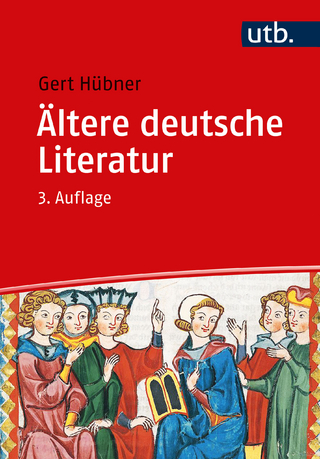
John Duns Scotus on Grace and the Trinitarian Missions
Brill (Verlag)
978-90-04-28633-7 (ISBN)
In John Duns Scotus on Grace and the Trinitarian Missions, Mitchell J. Kennard argues that Franciscan theologian John Duns Scotus (d. 1308) has been wrongly inscribed in the narrative of the late medieval theology of grace. Scotus is presented here not as the initiation or cause of the low fourteenth-century theology of grace but as the last great contributor to the high thirteenth-century theology of grace as deifying participation in the divine nature. This book argues that Scotus’s signature reflections on the relationship between grace and the Trinitarian missions—the Incarnation of the Son and the indwelling of the Holy Spirit—warrant closer attention by both historical and systematic theologians alike.
Mitchell J. Kennard, Ph.D. (2019, Southern Methodist University) is a research writer at Living Stream Ministry. He teaches and publishes both historical and systematic theology and has a particular interest in Christology, Pneumatology, deification, and the theology of the mystical Body of Christ.
Preface
1 Introduction John Duns Scotus on the Mystery of God’s Will
1 Scotus’s Place in the History of the Theology of Grace
2 Scotistic Axioms and Analytic Instruments
2.1 Immediate-Influence Axiom
2.2 Absolute and Ordained Power
2.3 Metaphysical-Priority axiom
2.4 Rational Instants
2.5 The Ordered-Willing Axiom
3 Grace and Charity
2 The Grace of God Grace as Deification of Nature
1 The Thirteenth-Century Consensus View—Grace as Deification
2 Grace as Essentially Supernatural
2.1 Aquinas on the Essential Supernaturality of Grace
2.2 Scotus on the Essential Supernaturality of Grace
2.3 Ockham on the Essential Supernaturality of Grace
3 Grace as Absolutely Essentially Supernatural
3.1 Aquinas on the Absolutely Essential Supernaturality of Grace
3.2 Scotus on the Absolutely Essential Supernaturality of Grace
3.3 Ockham on the Absolutely Essential Supernaturality of Grace
3.3.1 Ockham on the Moral Goodness of Charity
3.3.2 Ockham on the Natural Goodness of Charity
4 Reactions to Ockham
5 Conclusion
3 Spirit of Grace The Infusion of Grace and the Indwelling of the Holy Spirit
1 Scotus on the Non-necessity of Grace
1.1 Grace Is Necessary for the Remission of Sins
1.2 Grace Is Necessary for Loving God above All
1.3 Grace Is Necessary for Glory
2 Scotus on the Necessity of Grace
2.1 Uncreated and Created Grace
2.2 Scotus on Uncreated and Created Grace
2.2.1 Created Charity as Necessary and Sufficient for the Indwelling of the Holy Spirit
2.2.2 Created Charity as Participation in Uncreated Charity
3 The Scotistic Inversion
4 After Scotus
5 Conclusion
4 Christ’s Grace and Ours (1) The Alexandrian-Cappadocian Argument
1 The Alexandrian-Cappadocian Argument
2 The Three Graces of Christ
3 Scotus on the Grace of Christ
3.1 Personal Grace and Capital Grace
3.2 The Scotistic Inversion
3.3 Personal and Unitive Grace
3.4 The Scotistic Inversion
4 After Scotus
5 Christ’s Grace and Ours (2) The Anselmian Argument
1 The Anselmian Argument
1.1 Anselm’s Argument
1.2 Anselm’s Fortunes
1.2.1 C1: If Human Beings Fall, Some of Them Must Be Restored
1.2.2 C2: If Human Beings Are to Be Restored, They Must Make Satisfaction
1.2.3 C3: If the Human Race Is to Make Satisfaction, It Must Be by a God-Man
1.2.4 C4: If a God-Man Is to Make Satisfaction, it Must Be by His Own Death
2 The Scotistic Inversion
3 After Scotus
6 Conclusion John Duns Scotus and the Late Medieval Theology of Grace
1 Scotus and the Fourteenth-Century Theology of Grace
1.1 The Contingency of Grace and the Devaluation of Grace
1.2 The High Estimation of Nature’s Capacities and the Devaluation of Grace
2 Scotus and the Thirteenth-Century Theology of Grace
Bibliography
Index
| Erscheinungsdatum | 06.06.2022 |
|---|---|
| Reihe/Serie | Studies in the History of Christian Traditions ; 197 |
| Verlagsort | Leiden |
| Sprache | englisch |
| Maße | 155 x 235 mm |
| Gewicht | 541 g |
| Themenwelt | Geschichte ► Allgemeine Geschichte ► Mittelalter |
| Geschichte ► Teilgebiete der Geschichte ► Religionsgeschichte | |
| Geisteswissenschaften ► Philosophie ► Geschichte der Philosophie | |
| Geisteswissenschaften ► Philosophie ► Philosophie des Mittelalters | |
| Geisteswissenschaften ► Philosophie ► Philosophie der Neuzeit | |
| Religion / Theologie ► Christentum ► Kirchengeschichte | |
| Sozialwissenschaften | |
| ISBN-10 | 90-04-28633-0 / 9004286330 |
| ISBN-13 | 978-90-04-28633-7 / 9789004286337 |
| Zustand | Neuware |
| Haben Sie eine Frage zum Produkt? |
aus dem Bereich


